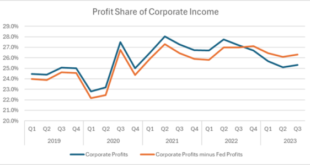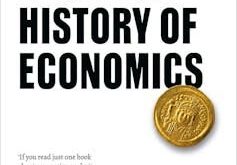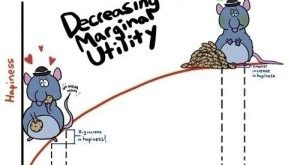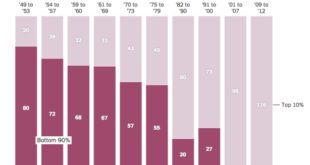from Lars Syll Time is a scarce resource on television. However, if one still — as is so often the case nowadays — uses precious airtime for trivial matters and meaningless ‘entertainment,’ there must be a reason. Television is — still — for a large part of the population one of the primary sources of information and worldview. Thus, filling program schedules with trivialities becomes an effective means to — instead of functioning as an instrument for shaping opinions and fostering...
Read More »Is “greedflation” over?
from Dean Baker Peter Coy used his column yesterday to beg President Biden not to use the term “greedflation” to explain the runup in inflation since the pandemic. I am sympathetic to much of his argument, most importantly, the idea that corporations suddenly turned greedy is a bit far out. As Coy notes, corporations are always greedy. The real question is whether something unusual was going on with corporate profits in the pandemic. There clearly was an increase in profit margins in the...
Read More »From micro to macro, Andrew Leigh’s accessible history covers the economic essentials: My review from The Conversation
Andrew Leigh’s The Shortest History of Economics is the latest in a series of such histories, mostly focused on particular countries. It begins with a striking mini-history of household lighting, focusing on the amount of labour required to produce the light now given off by a standard lightbulb: 58 hours for a wood fire, five hours for a candle based on animal fat, a few minutes for an early electric lightbulb, and less than one second for a modern light-emitting diode. The...
Read More »Old
In a few days time, I’ll be lining up in the 65-69 category for the Mooloolaba Olympic triathlon (1500m swim, 40km cycle, 10km run)[1]. People in this age category are commonly described as “aging”, “older”, “seniors”, “elders” and, worst of all, “elderly” (though this mostly kicks in at 70). The one thing we are never called is “old”. But this is the only term that makes any sense. Everyone is aging, one year at a time, and a toddler is older than a baby. Senior and elder are...
Read More »Why and how economics must change
from Jayati Ghosh Economics needs greater humility, a better sense of history, and more diversity The need for drastic change in the economics discipline has never been so urgent. Humanity faces existential crises, with planetary health and environmental challenges becoming major concerns. The global economy was already limping and fragile before the pandemic; the subsequent recovery has exposed deep and worsening inequalities not just in incomes and assets but in access to basic human...
Read More »“Κοινωνική Ασφάλιση – Συνταξιοδοτικό & Αμοιβές της εργασίας στο Δημόσιο” – Ρέθυμνο 11/3/2024
Εκδήλωση Κοινωνικού Πολύκεντρου ΑΔΕΔΥ στο Ρέθυμνο “Κοινωνική Ασφάλιση – Συνταξιοδοτικό & Αμοιβές της εργασίας στο Δημόσιο” Το Κοινωνικό Πολύκεντρο σε συνεργασία με την ΑΔΕΔΥ και το Νομαρχιακό Τμήμα ΑΔΕΔΥ Ρεθύμνου συνδιοργανώνουν εκδήλωση στο Ρέθυμνο με θέμα «Κοινωνική Ασφάλιση – Συνταξιοδοτικό & Αμοιβές της εργασίας στο Δημόσιο»τη Δευτέρα 11 Μαρτίου στις 18:00 στο Επιμελητήριο Ρεθύμνου (Εμμ. Πορτάλιου 23). Το θέμα θα αναπτύξουν ο κ. Στ. Μαυρουδέας, Καθηγητής του...
Read More »“The Political Economy of COVID-19”
New book from WEA Books At the beginning of 2020, the outbreak of Covid-19 and the lockdown practices imposed worldwide generated a global economic crisis that challenges the traditional explanations of economic downturns . Like the economic crisis of 2008, the Covid-19 pandemic crisis was systemic and global, and this collection of essays examines it in a broad geographical and historical context. Kindle $6.00 Paperback $14.99Amazon US UK FR DE IN ...
Read More »Utility theory — explaining everything and nothing
from Lars Syll Despite the rise of behavioral economics, many economists still believe that utility maximization is a good explanation of human behavior. Although evidence from experimental economics and elsewhere has rolled back the assumption that human agents are entirely self-interested, and shown that altruism and cooperation are important, a prominent response has been to modify individual preference functions so that they are “other-regarding”. But even with these modified...
Read More »Dutton wants a ‘mature debate’ about nuclear power. By the time we’ve had one, new plants will be too late to replace coal
My latest in The Conversation via my Substack If you believe Newspoll and the Australian Financial Review, Australia wants to go nuclear – as long it’s small. Newspoll this week suggests a majority of us are in favour of building small modular nuclear reactors. A poll of Australian Financial Review readers last year told a similar story. These polls (and a more general question about nuclear power in a Resolve poll for Nine newspapers this week) come after a concerted effort...
Read More »Income inequality in the USA increased with each expansion
Pavlina R.Tchemevra is the source of the data for this chart which appeared in September 2014 in the New York Times in an article by Neil Irwin “The Benefits of Economic Expansions Are Increasingly Going to the Richest Americans”. Can anyone source or provide an updated version of this chart?
Read More » Heterodox
Heterodox







